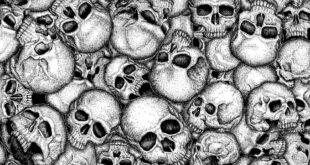Diversity Macht Frei
January 29, 2017
The German president Joachim Gauck is, mercifully, coming to the end of his mandate, although his successor Steinmeier is not likely to be any better and may well be worse. Gauck was speaking in Paris a few days ago.
At the end Gauck comes to the verdict that Europe, alongside the good, has brought forth and experienced much that is horrific: “Every conceivable horror has been committed here. There is truly no reason to paint a gold-tinged picture of Europe. There was never a golden age and perhaps will also never be one.” There is only the endlessly recurring struggle for humanity, freedom and rights, peace, justice and democracy.
These are the words of a man who has imbibed and internalised the European Guilt narrative, one that has been carefully crafted and elaborated over the decades, largely by Jews. The Talmud stigmatises non-Jews as unclean and contaminated and these tropes endlessly recur in Jewish discourse. From Marxism, to Freudian psychology, “Islamophobia” (a term coined by the Jew Richard Stone (link) to the “virus of antisemitism” – in Jewish ideation Europeans constantly appear as the pathologised Other.
Björn Höcke of the AFD recently pointed out that it is not psychologically healthy for any people, and especially children, to immerse themselves in an endless bath of shame. Of course he was immediately met with Hitler comparisons and demands for his dismissal (link).
For the purposes of advancing their own agenda, Jewish activists have clearly grasped the utility of fostering a sense of shame among the Goyim. Here we have V. Judah Khaykin (link), Associate Director of the Anti-Defamation League, expressing approval of the pervasive self-flagellation he sees in Germany.
… for its part, Germany has made tremendous strides over the last several decades to engage in an inter-generational public discourse around and atone for the Holocaust. They even have a characteristically lengthy term for this process: Vergangenheitsbewältigung, literally “the struggle to work through the negatives of the past.”
German efforts at atonement and reconciliation are extensive and pervade government, civil society, the educational system and the very landscape of German cities and towns. The memory of the Holocaust is so central to Germany today that the government saw it fit to set aside five square acres of prime real estate in the German capital, just blocks from the Reichstag and Chancellery, for the purposes of a Memorial to the Murdered Jews of Europe.
…in Germany, reminders of the dangers of racialist ideologies and human callousness are ubiquitous. As we walked through the streets of Berlin, and other towns, we were confronted with hundreds of small, cobble-stone sized brass plaques that mark the entrances of German buildings. Known as stolperstein, or “stumbling stones,” these installations serve as omnipresent reminders of the murdered Jews and other victims who once inhabited German cities.
He laments the fact that Americans refuse to engage in similar shame immersion, slyly using words like “us”, “we” and “our” to imply that he wishes to take the burden of shame upon himself .
Conversely, America neglects to properly address the genocide that took place on American soil. The closest America ever came was the proposed National American Indian Memorial which was slated to be erected in New York harbor in 1913. The monument never materialized, save for a bronze plaque marking the site of the ground-breaking, which, too, disappeared by the 1960s.
… America is rife with sites of mass extermination of its indigenous peoples. Yet instead of honoring the victims with enough memorials that declare “never again,” our nation is littered with monuments, both in stone, such as Nathan Bedford Forrest Monument (shown above) in Memphis and Stone Mountain, Georgia – and in civic time (eg. Columbus Day) honoring the perpetrators of mass racial violence.
…So here’s a modest proposal. Let us no longer continue to ignore the questions for fear of the difficult answers. Let us begin the arduous and painful journey toward full ownership of our national history, toward atonement for past wrongdoings, and acknowledgement of ongoing challenges for our indigenous populations. We can start with a genocide museum. Or with stumbling stones of our own.
…Citing the first genocide of the 20th century as herald of his own Final Solution, Hitler famously said, “who remembers the Armenians?” Well, who remembers the Native Americans? If we are sincere about building a future free from hate and racial violence, we must.
But, of course, Jews refuse to engage in any similar introspection about their own less than spotless historical record (link and link), instead churning out bogus historical narratives about their own eternal victimhood.
 Daily Stormer The Most Censored Publication in History
Daily Stormer The Most Censored Publication in History



